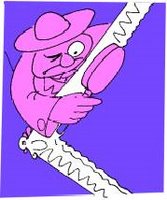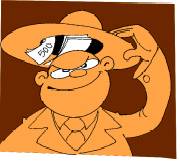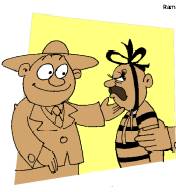
1. WE CAN CHANGE YOUR LIFE
Disasters like the train blasts of last week brought to the fore an otherwise marginalised group of experts—the forensic scientists. It is this group that collects the reliable and irrefutable evidence which eventually lead to conviction. You may think they are only relevant when there is a calamity, but forensic experts can impact your life in more ways than you can imagine.
Sample this: You have succumbed to the great art rush and bought a very expensive painting. A few days later, paranoia grips you, and you suspect that it may be a fake. Who do you call? The forensic guys. A QDE, or ‘questioned document examiner’, is equipped to check for forged signatures, erasures and obliterations. A forensic botany expert will be able to look at the wooden frame and tell you when it was made, or test the vegetative matter in the paint to determine how old it is.
Or lets say your grandmother dies and the will is being contested by the 19 children and grandchildren. It is, again, a QDE who will tell you whether the will was written under strain, in different stages or continuously, and even whether it is an original. Forged currency is another regular problem that we encounter. The problem is that despite its widespread applications, there are not enough independent agencies or laboratories.

2. INVESTIGATORS ARE NOT ADEQUATELY TRAINED
Historians have suggested that the world’s first fingerprint identification bureau was started in Calcutta in 1897 by William Herschel, the collector of the district of Hooghly in Bengal, who devised a system of registering finger impressions of native contractors to safeguard the interests of the British government. Even thousands of years ago, Indians knew that handprints, or tarija, were unique and they used thumbprints as signatures.
But regrettably, like much in India—from drainage systems to the performing arts—the past often supersedes the present. Today, investigators are not adequately trained in this science. Something as basic as cordoning of the scene of crime to prevent destruction of evidence is not practiced. After the blasts, VIPs were allowed to walk on the sites. Police investigators rely more on gut and experience than on training. When gathering evidence, they rarely use gloves. They do not individually package evidence to maintain its integrity. Photographs are often not taken with appropriate parameters, good lighting, and through different filters.
“The evidence has to talk to you,” says a forensic expert. She describes the case of a senior citizen’s recent murder. The photograph of the body also featured about 10 pairs of shoes surrounding the body. “Those feet shouldn’t have been in the frame. What were so many people doing at the scene of crime in the first place?”

3. WE CAN BE RATHER CORRUPT
Sources say that the profession is rife with corruption. Given the massive stakes involved, it is hardly surprising. Corruption is worst in the case of autopsies, where changing the cause of death can alter a conviction. As a forensic teacher says, “The body does not lie about the cause of death, the examiner does.” Half the time, the autopsy is being conducted by a ward boy in a government hospital, reveals a forensic expert.
Ethics are a big part of this science. A forensic expert can change a case from guilty to not guilty. There was a case where a government document examiner, who was reputed for his uprightness, merely had to walk into the courtroom, and the minute the defendants saw that he was a key witness, they would admit guilt and ask to work out a settlement.

4. DON’T RELY ON GOVERNMENT RESOURCES
There hasn’t yet been occasion for it, and hopefully there never will be, but if a disaster equivalent to a 9/11 were to hit the city, the state’s forensic department would be singularly unequipped to deal with it. When 9/11 took place, the government appointed a series of highly qualified independent agencies to conduct sophisticated DNA tests and examine evidence.
There is only one laboratory equipped to conduct DNA tests in Mumbai. It would scarcely be able to keep up with the load if there were a serious disaster.

5. THERE’S A LOT YOU CAN DO ON YOUR OWN
Like First Aid, people should be aware of some basic dos and don’ts at a scene of crime. Let’s say there’s been a burglary in your neighbour’s home. If you want to be able to help, maintain a log book of who is doing what, or entering and leaving the premises. Note the shoes they were wearing. All this helps during reconstruction of the crime.
Also, remember that forensics is based on Locard’s Exchange Principle. Basically, when two surfaces come in contact, they exchange trace evidence—say sweat from one, and dust from the other. So, if you are at a crime scene, and innocently lean on something, you may have just wiped out crucial evidence.

No comments:
Post a Comment